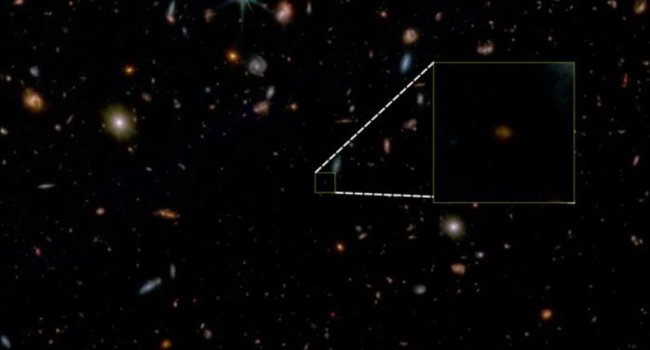
“Dead” galaxy: Why did new stars suddenly stop being born in it?
The James Webb Space Telescope (JWST) has discovered the oldest "dead" galaxy: about 13 billion years ago, it "suddenly" stopped forming stars, astronomers from the University of Cambridge have found.
According to scientists, this happened approximately 700 million years after the Big Bang.
As Interesting Engineering reports, the early Universe was a very mysterious place, and scientists still don't fully understand what happened in the early space years. The new discovery only added new mysteries.
Research with the Webb Telescope has shown that this galaxy experienced a short, rapid burst of star formation that lasted approximately 30-90 million years. Then, within 10-20 million years, star formation in the galaxy abruptly stopped. That is, the galaxy transitioned from active star formation to an extinct state much faster than expected.
“The first few hundred million years of the Universe were a very active phase, with many gas clouds collapsing to form new stars,” said Tobias Luser, first author of the paper from the Kavli Institute of Cosmology. “Galaxies need an abundant supply of gas to form new stars, and the early Universe was like an all-you-can-eat buffet.”
According to scientists, star formation activity in galaxies of those years should have decreased gradually, but this particular galaxy stopped forming stars surprisingly early.
Why?
Scientists have several assumptions. One possible explanation could be a supermassive black hole at the center of the galaxy. Its huge jets are capable of displacing vital stellar gas from the galaxy, preventing the birth of new stars.
On the other hand, the stars could quickly absorb the galaxy's gas. In this case, the galaxy may not be able to quickly replenish gas, which will lead to the depletion of this “building material”.
However, scientists are not sure that people from these scenarios can explain what they observe in this galaxy. Moreover, scientists do not know whether the cessation of star formation in this galaxy is just a lull - and it will someday resume, or whether the galaxy has finally “died.”
The results of the study were published in the journal Nature.
- Related News
- Wheel of Death: new method will help astronauts stay fit in low gravity
- Due to anomalies of Orion spacecraft, lunar exploration program may be delayed for years։ NASA
- TAO Observatory: World's highest telescope to study evolution of galaxies and exoplanets
- Powerful M9.5 solar flare causes radio blackout in Pacific Ocean
- What will happen to the Earth if the Moon disappears?
- Key to conquering the Red Planet: Why is NASA studying solar storms on Mars?
- Most read
month
week
day
- Digital Julfa Network is launching a pan-Armenian centre in the metaverse, on the Fastexverse virtual platform 914
- Xiaomi unveils exclusive Redmi Note 13 Pro+ dedicated to Messi and Argentina national team 802
- Sparkles: Boston Dynamics unveils a furry robot dog that can dance (video) 796
- Is there a ninth planet in the solar system? Scientists find new evidence 672
- Smartphone catches fire in child's hand in Russia 657
- What will happen to the Earth if the Moon disappears? 648
- How to understand how protected a smartphone is from water and dust? 638
- World's largest 3D printer was created in USL It prints 29 meter-long structures 622
- iPhone 16 may get colored matte glass back panel, 7 colors 613
- New iPad Pro to receive M4 chip and to be more powerful than Apple computers 611
- Archive
